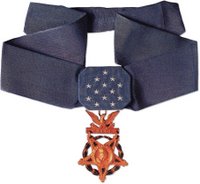FREDERICK PLATTEN
Sergeant, Company H, 6th US Cavalry
Born: 1849, Torbeck, Ireland
Died: 2 March 1939, Arizona(?)

Citation: With 5 other men he waded in mud and water up the creek to a position directly behind an entrenched Cheyenne position, who were using natural bank pits to good advantage against the main column. This surprise attack from the enemy rear broke their resistance.
RICHARD LONGSTREET TEA
Sergeant, Company H, 6th US Cavalry
Born: 1842, Philadelphia, Pennsylvania
Died: 14 September 1911, Prescott, Arizona

Citation: With 5 other men he waded in mud and water up the creek to a position directly behind an entrenched Cheyenne position, who were using natural bank pits to good advantage against the main column. This surprise attack from the enemy rear broke their resistance.
PETER W GARDINER
Private, Company H, 6th US Cavalry
Born: 1841, Carlisle, New York
Died: 1883, Arizona

Citation: With 5 other men he waded in mud and water up the creek to a position directly behind an entrenched Cheyenne position, who were using natural bank pits to good advantage against the main column. This surprise attack from the enemy rear broke their resistance.
ELISHA SIMPSON HORNADAY
Private, Company H, 6th US Cavalry
Born: 24 March 1851, Hendricks County, Indiana
Died: 9 July 1923

Citation: With 5 other men he waded in mud and water up the creek to a position directly behind an entrenched Cheyenne position, who were using natural bank pits to good advantage against the main column . This surprise attack from the enemy rear broke the ir resistance .
JAMES LOWTHERS
Private, Company H, 6th US Cavalry
Born: 1852, Boston, Massachusetts
Died: unknown

Citation: With S other men he waded in mud and water up the creek to a position directly behind an entrenched Cheyenne position, who were using natural bank pits to good advantage against the main column. This surprise attack from the enemy rear broke their resistance.
MARCUS M ROBBINS
Private, Company H, 6th US Cavalry
Born: 25 July 1851, Elba, Wisconsin
Died: 21 June 1924, Pittsfield, Massachusetts

Citation: With 5 other men he waded in mud and water up the creek to a position directly behind an entrenched Cheyenne position, who were using natural bank pits to good advantage against the main column. This surprise attack from the enemy rear broke their resistance.
Note: This action took place at Sappa Creek, Kansas, on 23 April 1875. Private James F Ayers and Trumpeter Michael Dawson were also awarded the Medal of Honor for gallantry during this battle.
 Citation: On the night of the 26th July, 1897, at the Malakand, Lieutenant Costello went out from the hospital enclosure, and, with the assistance of two sepoys, brought in a wounded Lance-Halvidar who was lying 60 yards away in the open on the football ground. This ground was at the time overrun with swordsmen and swept by a heavy fire both from the enemy and our own men who were holding the sapper lines.
Citation: On the night of the 26th July, 1897, at the Malakand, Lieutenant Costello went out from the hospital enclosure, and, with the assistance of two sepoys, brought in a wounded Lance-Halvidar who was lying 60 yards away in the open on the football ground. This ground was at the time overrun with swordsmen and swept by a heavy fire both from the enemy and our own men who were holding the sapper lines.

















